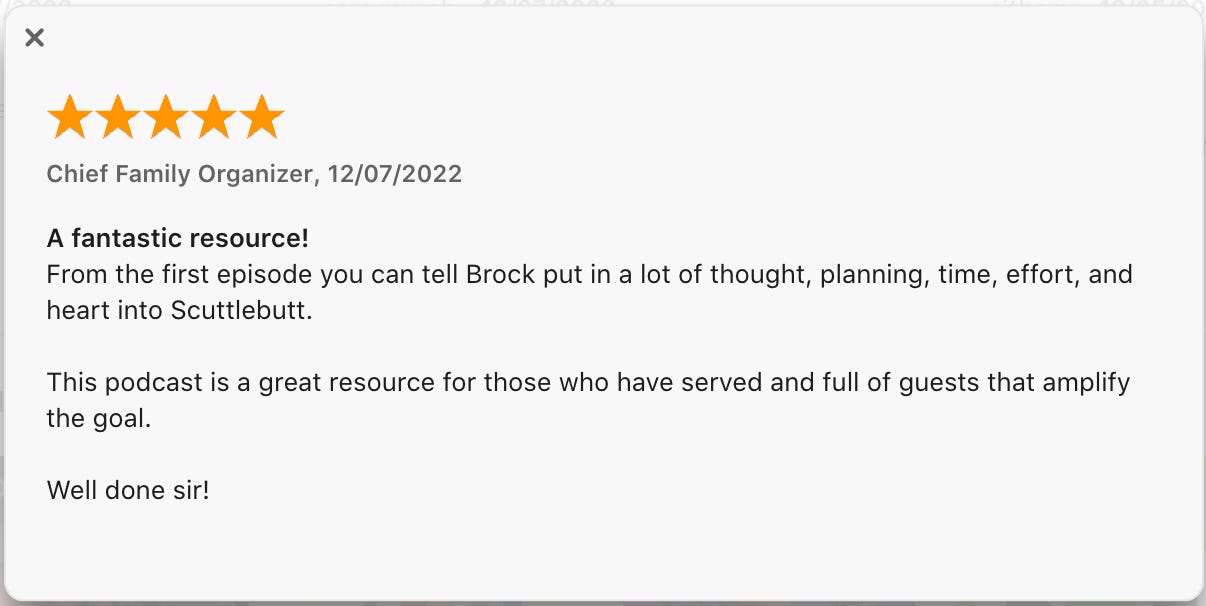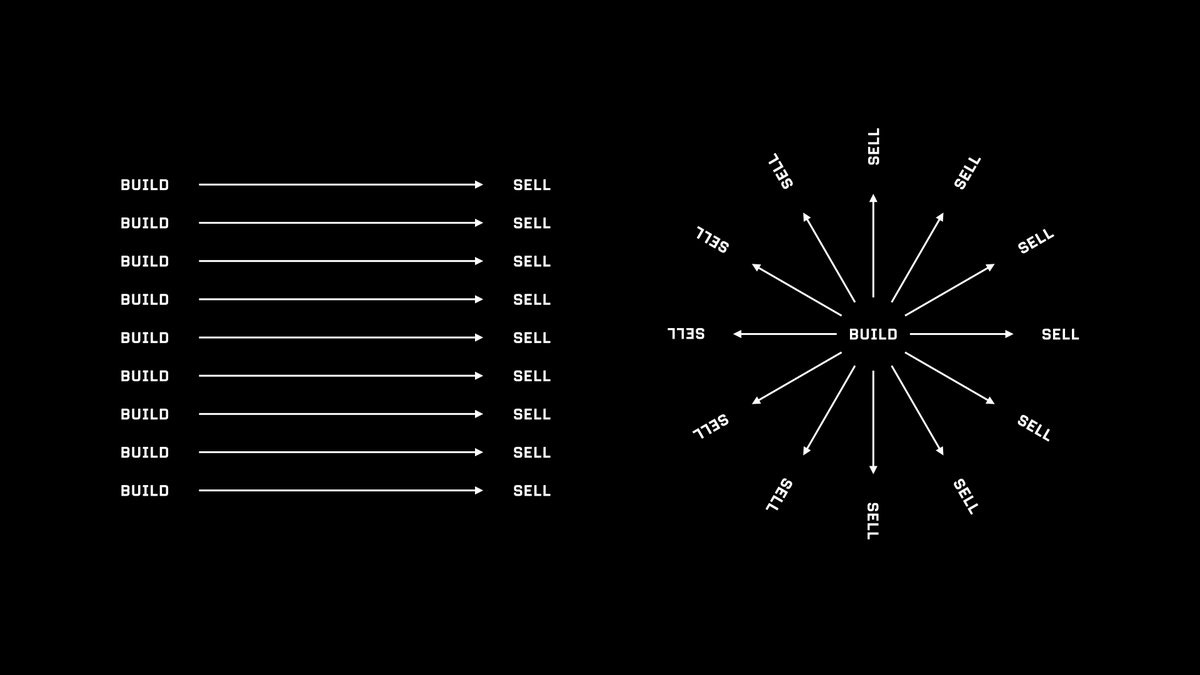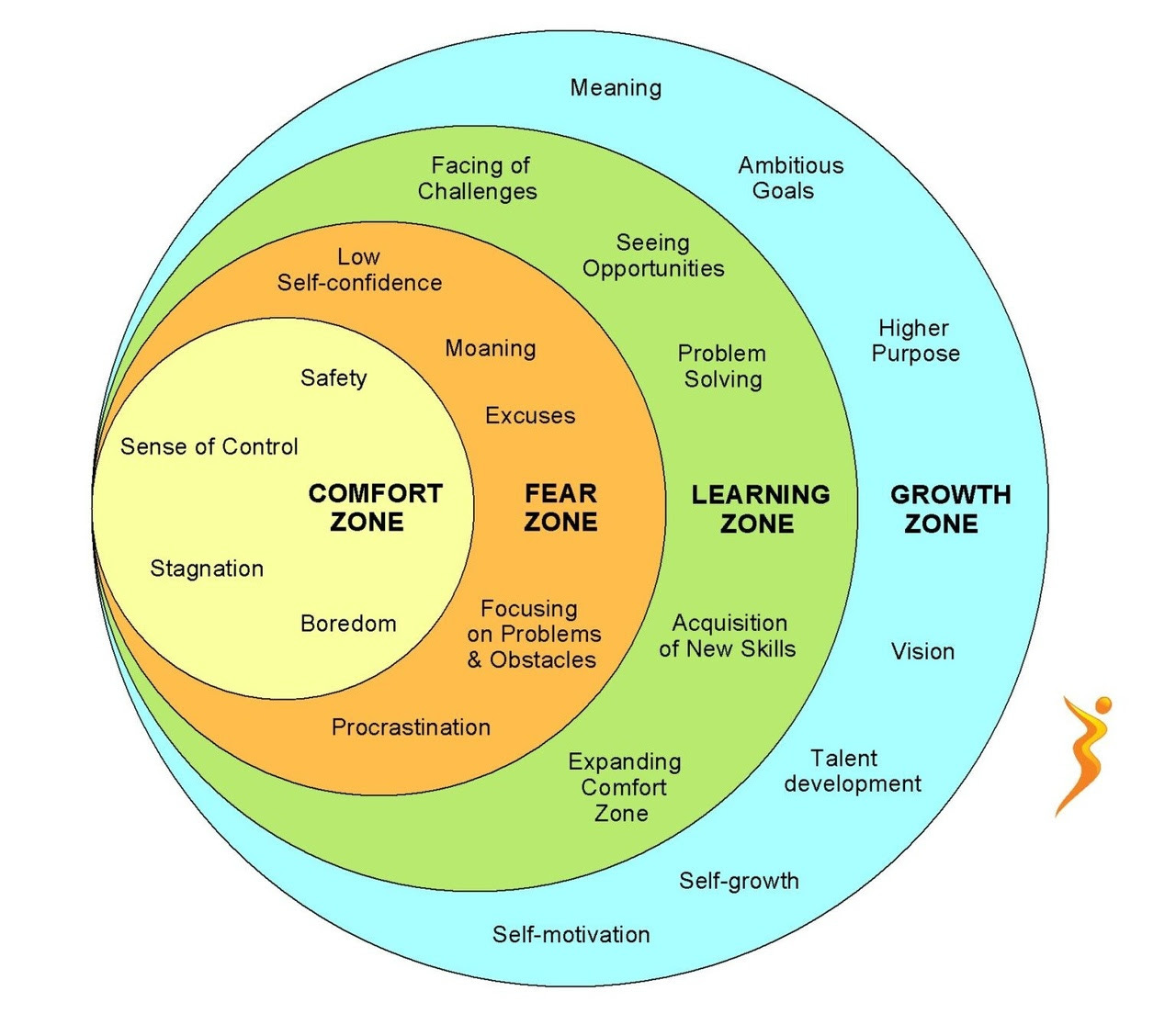A Year in Review
Business lessons from podcasting | Everything I've changed my mind on about the military
Good morning and happy Friday.
Normally I love sitting down to write early in the morning with a cup of coffee, but today don’t have the pleasure of the coffee part. I had a septoplasty procedure yesterday (turns out I’ve been living with one nostril airway almost completely closed for God only knows how long) and as I’m learning is extremely difficult to have coffee with my nose packed full of gauze. All bets are off when the coffee isn’t on.
As a quick reminder, there are few days left to enter the giveaway. Leaving a rating for the podcast and upload it here for $1000 worth of swag - books, coaching, coffee, a ticket to the Military Influencer Conference next year, and a year subscription to 7investing. All items come from veteran owned businesses and services featured on the podcast. Thank you Chief Family Organizer for the great review!
I released a solo episode this week discussing a my larger takeaways from the last year podcasting as well as some things I’ve changed my mind on when it comes to the military and veteran community. Here are a few of the highlights.
Build Once, Sell Twice
This is an idea I alluded to, but didn’t talk nearly as extensively about. I’m extreme about optimization, like uncomfortable extreme. I’m the type of person that while doing chores around the house, I have to sit down first and think about the most optimal order to get them accomplished in - laundry gets started first because it takes longest, then dishwasher start, etc. Although I spend a lot of time optimizing daily routines for time, this podcast is the highest ‘return on time’ project I’ve ever worked on.
It’s extremely easy to get stuck in the idea of being on a ‘content treadmill’ doing this. That term is used by creators generally to describe never ending loop you’re on when you commit to a weekly newsletter or podcast. I was feeling that big time two years ago trying to write a weekly financial newsletter. What I’m finding is that podcast episodes are something that will continue to benefit the longer its alive, like good wine or compound interest.
While my focus week to week is on producing the next week’s show, I’m still benefitting from the work I did last week, and the week before that. In fact, the highest downloaded show at this point is still the very first episode! Arguably, that should be the worst episode being new to it, editing process not as refined, and worse quality general. The reality is because it’s been out for the longest, more people have been able to discover it and I didn’t have to do anything other than produce it the one time. No marginal cost of replication.
The concept of no marginal cost of replication is something touted in software businesses. When you pay for Microsoft Word access every month, Microsoft doesn’t need to continue paying for that to exist. They’ve already built it once, but continue to benefit from millions of paying users every month. Compare that to a business that sells dining room tables. If they don’t have tables to sell, they don’t make money and thus need to continue producing.
My challenge to you would be to think about what you’re benefiting from today that you only had to work once. Its harder than you think to find something. Your job sadly isn’t one; while you benefit from work you’ve done in the past, you can’t stop showing up. Any promotions you’ve received suddenly don’t mean much when you’re not there to shoulder the responsibility you’ve earned. Strangely a similar case with relationships. There’s compound interest at work there, but if you stop showing up for your partner, you’re in the same position.
Implementation
I’ve tasted the sweetness of building once and selling twice and aim to double down on it this next year by getting the podcast into more places to benefit from that. I’m deep into the process of preparing all the content for Youtube which is a massive search library that only continues to grow. This will serve to widen the surface area for the podcast in which to benefit from building something once.
High Trust, Low Signal
Podcasting is an extremely high trust and low signal medium. How do you develop trust with someone? One of the key ingredients is going to be time. You need time and repeated occurrences to believe it will happen again or give you the information or rush it did in the past. Social media, at its core, is an establishment of trust. Not necessarily the information on it, but what you as a user get from it. They’ve built a relationship in that you trust them to deliver what you’re looking for whether it’s car videos or cooking recipes.
If you’re a frequent podcast listener, you inherently develop a relationship with the people you’re listening to. If you’ve listened to every episode put out over the last year, You’ve spent well over 50 hours just listening to me talk. There are people out there who I’ve never spoken to ever, but know me and my stories because of that. Little weird and embarrassing to think of it that way, but I gave up trying to maintain a sharp presence of myself online as soon as there were photos of me in teal skinny jeans and straightened hair on Myspace.
Normally in high trust relationships, there’s a lot of feedback that takes place. As you develop high trust with a friend or partner, you receive signals along the way that alert you. If you do something that upsets them, hopefully you hear about it and that allows you to alter course in some way. That is largely missing from the podcasting medium.
While there are things like download numbers, ratings, and reviews to base feedback on, those may not always be the best judge of success especially in a creative field. There’s some statistic that most podcasts don’t reach 20 episodes and I suspect it’s for reasons like these - judging based on the wrong signals.
While it would be easy to sit back and say download numbers aren’t a good measure of feedback, I’m just going keep doing what I’m doing, I don’t think that’s necessarily the right approach. Striving to be better at something requires getting out of the comfort zone and continuing to test new things and experiment despite not hearing back.
The takeaway is that there are many environments we operate in that we don’t receive signals about the effectiveness of what we’re doing. The lack of signals is not an excuse to continue doing nothing. Try new things out and see how your employees, your audience, your coworkers respond. There are very few one way doors in life or things you can’t correct.
Implementation
Part of my reflection process about the high trust relationship dynamic of podcasting has brought me to the realization of where it falls in marketing terms. I’ve avoided marketing like the plague because it always too “woo woo” for me. Nothing ever seemed concrete.
This last year I’ve spent probably 98% of the time working on the podcast and 2% on marketing (social posting, repurposing content, active engagement). That probably would be fine with a well established audience, but it isn’t yet and so I’m looking to a marketing concept to better tackle the problem.
Marketing has this term of a funnel that depicts a customer journey as they travel through the process of either buying or engaging in what you offer. First they become aware of it, find interest, and down through being a loyal customer. Knowing what I do about the trust of the podcasting relationship, I’ve realized I’m offering a bottom of funnel product with zero top of funnel. I can’t expect people to engage in a loyalty offering right from the start.
I’m doing things to experiment with the first two steps in the customer journey process.
Running the giveaway was a way to generate awareness of the podcast. The results of that remain to be seen, but is a way to create hype around something.
Short form video is a big opportunity to capitalize on content that already exists. If people aren’t interested in watching a 30 second podcast clip, it’s unlikely they’ll sit through an hour an 30 minutes of one.
And lastly, I’m looking to nurture this newsletter. The aforementioned period of finance writing put a bad taste in my mouth about a weekly newsletter (odd given the work required is about 1/100 that of a podcast), but email is where people like to communicate and is a lower entry threshold for people to get a free newsletter then to commit to a long recording.
Summed up - let go of your preconceived notions. Test new things, study results, implement what works.
Something I was wrong on
Theres a lot of them.
I was wrong about the amount of resources and services available to service members and veterans. When I got out of the service, I felt blindsided. I was told about a lot of resources, but when it came time to utilize them, where were they?
The problem that got in the way of being connected with more resources was I think largely driven by my mindset leaving service. I’ve spoken many times about how when I exited, I looked to turn the page on my military service. I didn’t want to be “that guy”, the vet bro back in their home town recounting tales of valiant service (mostly painting and cleaning up spilled pickle juice in the hallway I was responsible for keeping clean).
Thinking I would be perceived a certain way drove me away from anything affiliated with the military, resources or otherwise. My instinctual response from not being helped from these resources was there wasn’t any available. Reality has shown that I just closed my eyes to them.
If you’re transitioning out of the service, don’t be a hero. It’s okay to accept help and if you have a need, I guarantee there’s a resource there to help with it. Being plugged back in with this community in such a big way over the last year and drawn my attention to a seemingly never ending amount of non profits, content, and individuals who seek to help people in this position. If that’s you, reply to this and let’s chat - I would love to help you in anyway that I can.
Implementation
It needs to be accepted that just because you don’t know something exists, doesn’t mean it doesn’t. The internet has afforded every niche you could possibly think of to exist both in content and community.
A conclusion I’ve been working on getting to since getting out of the service is that I want to work for myself in a high leverage, diversified way that is likely a collection of many small businesses I could run. Over black friday, I found a community of people who do exactly this. It’s called ‘A Portfolio of Small Bets’ and its run by a gentleman named Daniel Vassallo.
A former Amazon engineer, Daniel rightfully noticed his high dependency on his job and if he were to lose it, the lifestyle he’d built around it would crumble. After saving some money, he stepped away to build his portfolio of small bets, a collection of small micro businesses that he runs to sustain his life. He has written a few ebooks, created several courses, runs a paid community (what I joined), makes cutting boards on the side, and several other things. What’s remarkable about that is he has built businesses around his interests. He brags all the time that nobody can tell him when to wake up in the morning anymore.
That’s what I’m working towards (hopefully my boss isn’t reading this).
Summed up. There are tools and resources beyond measure that exist in the world; don’t use your own blindness to them as an excuse. When you do find them, be open to use them, don’t let pride get in your way. And lastly, if it truly doesn’t exist, build it yourself so others can benefit.
You can find my thoughts about each of these items and several more in this week’s show on Monday - Scuttlebutt01, my new experiment around some shorter form solo episodes discussing things I’m thinking about and learning.
I also spoke with Olivia Nunn on Wednesday where we discussed finding your mission before and after service, 3 necessary things for a successful transition, and a spicier topic, how the military responded to Black Lives Matter and perhaps how they should have responded.
What are your plans for the holidays? Would love to hear about them and any great holiday recipes you might have. You can always reply to this email and that comes right to me.
🤘 B





